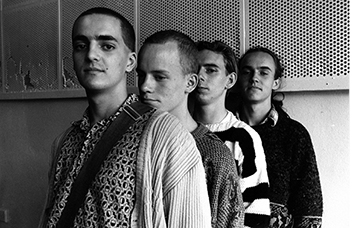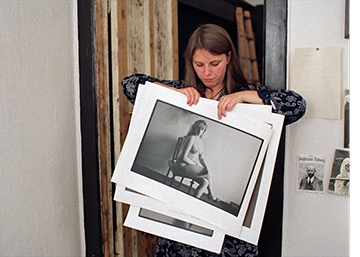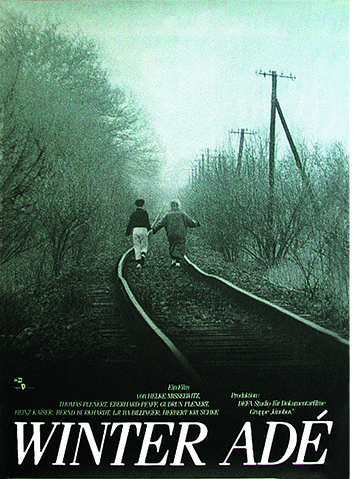Portraits From An Other Germany
Portraits from an Other Germany: The Early Films of Helke Misselwitz
Portraits from an Other Germany is a retrospective season dedicated to the work of East German documentary filmmaker Helke Misselwitz. Her work, much of which was subject to strict censorship rules, captures the dying years of the German Democratic Republic (GDR) through the lens of those who lived through it, providing an extraordinary portrait from a country which no longer exists.
Curated as part of the Film Studies, Programming and Curation MA at the National Film and Television School, these events will focus on Misselwitz’s early work, beginning with the two films Misselwitz made in the years immediately preceding German reunification, Bulky Trash (1990) and Who is Afraid of the Bogeyman? (1989). We will then examine Misselwitz’s interest in still photography through the programme ‘History with a Human Face’, which will include three of her short films, Marx Family (1983), 35 Photos (1984) and Nude Photography – Gundula Schulze (1983), alongside a feature from West German director Jutta Brückner, Do Right and Fear No One (1975). We will end the season with a screening of Misselwitz’s (perhaps) most celebrated film, After Winter Comes Spring (1988).
In all of these films, we gain an appreciation for Misselwitz’s sensitive and perceptive interview style, which creates an intimate frame through which to view the private lives of her contributors. Misselwitz tirelessly seeks out personal stories from ordinary people, an approach which occasionally brought her into conflict with film censors when these stories did not conform to official narratives. Her talent as an interviewer is more than matched by her technical mastery; with each stunning composition, Misselwitz reveals how individuals move through the world they inhabit, highlighting the subtleties of relations between the individual and the collective.
The screenings will take place on the 22nd, 24th and 25th of September 2022 at the Goethe-Institut London and the ICA. Helke Misselwitz will be in conversation via Zoom after the screening of After Winter Comes Spring, and will introduce the History with a Human Face programme via Zoom. Recordings of these will be made available online following the events.
Emily Mason, Film Programmer
We’d like to thank Deutsche Kinemathek for their support with this programme.
Twitter: @anothergermany
Instagram: @portraitsfromanothergermany
- Thursday 22nd September | Bulky Trash & Who Is Afraid Of The Bogeyman?
- BOOK NOW -
Thursday 22nd September - 7pm
Goethe Institut London
Full programme run time: 130 mins
Bulky Trash (Sperrmüll)
Dir. Helke Misselwitz | GDR | 1990 | 78 mins
Who is Afraid of the Bogey Man? (Wer fürchtet sich vorm Schwarzen Mann)
Dir. Helke Misselwitz | GDR | 1989 | 52 mins
 To begin the season, we will look at some of Misselwitz’s most timely work, filmed in the years leading up to the fall of the Berlin Wall. In Bulky Trash (1990) the signs of the times are ever present, with protests against the GDR’s leadership forming the tumultuous background against which the four young musicians at the centre of the film live their lives. Through their punk band, Bulky Trash, ideas around youth culture are explored, as well as questions of how young people relate to older generations, and how they view the possibility of German reunification.
To begin the season, we will look at some of Misselwitz’s most timely work, filmed in the years leading up to the fall of the Berlin Wall. In Bulky Trash (1990) the signs of the times are ever present, with protests against the GDR’s leadership forming the tumultuous background against which the four young musicians at the centre of the film live their lives. Through their punk band, Bulky Trash, ideas around youth culture are explored, as well as questions of how young people relate to older generations, and how they view the possibility of German reunification.
Who’s Afraid of the Bogeyman? (1989) focuses on coal delivery workers, with the female owner of a family coal business at the forefront. Rather than an overly sentimental view of the work they do, we instead gain an understanding of the problems faced by these workers. Misselwitz’s emphasis on their private lives would have previously been considered taboo in East German cinema, not least due to the discussions of alcoholism, suicide and the possibility of escaping to the West.
NB: ‘In German, the title of the film refers to a rhyme in a common children’s game with roots in the Middle Ages. Now, and for centuries, it has also had racist overtones. We think the English word “bogeyman” best parallels and captures the intentions of the director.’ – DEFA Film Library 2021This screening will be introduced by Emily Mason.
- Saturday 24th September | Shorts Programme: History With A Human Face
- BOOK NOW
Saturday 24th September - 4.30pm
ICA London
Full programme run time: 90 minsPhotographs and their ability to convey meaning appear time and time again throughout Helke Misselwitz’s work. Through photography, she is able to explore intimate, personal experiences, alongside broader social and political events, investigating how these big and small histories are interlinked. Featuring three of Misselwitz’s shorts, alongside a film from West German filmmaker Jutta Brückner, this programme explores how history can be told through the lives of individuals, and indeed, how our lives can be understood through fragmented images.
Marx Family (Marx-Familie)
Dir. Helke Misselwitz | GDR | 1983 | 6 minsAgainst the backdrop of a house in ruins, we see historical photographs and drawings of Karl Marx and his family and hear excerpts from personal letters written during their time in London in the 1850s. Originally titled ‘Family Report’, this experimental short was made as part of a project commemorating the 100 year anniversary of Marx’s death, but none of the films which were made were accepted by the authorities. These films were eventually released years later, in 1988.
35 Photos (35 Fotos)
Dir. Helke Misselwitz | GDR | 1984 | 7 minsCommissioned for the 35th anniversary of the GDR, 35 Photos offers a portrait of one woman’s life story, told through one photo per year since her birth. Authorities felt that the film’s subject was an atyplical example of an East German woman, and therefore banned the film.

Nude Photography - Gundula Schulze (Aktfotografie – z.B. Gundula Schulze)
Dir. Helke Misselwitz | GDR | 1983 | 12 minsThis film centres on the photographer Gundula Schulze, whose work in the 1970s and 80s captured the intimate details of those living in East Germany. She explains how through her nude photography, she hopes to move past the superficiality of other erotic photographs, instead capturing something more real about her subjects.
Do Right and Fear No One (1975)
Dir. Jutta Brückner | West Germany | 1975 | 65 minsIn another biography told through photographs, West German filmmaker Jutta Brückner fixes her camera on her own mother. Beginning in 1922, we follow her mother’s story as she navigates the tumultuous events of the 20th century. The film foregrounds collective fears, fates, and fortunes, interrogating the relationship between the individual and broader society.
This screening will feature an introduction from Helke Misselwitz via Zoom.
- Sunday 25th September | After Winter Comes Spring
- BOOK NOW
Sunday 25th September - 2.30pm
ICA LondonAfter Winter Comes Spring
Dir. Helke Misselwitz | GDR | 1988 | 116 mins"At the age of forty I again leave the town of my childhood in order to discover how others have lived, how they would like to live. On the journey we will talk with each other, meeting at work or at home, by arrangement and also by chance. Sometimes we will only look at them—women and girls of this land." - Helke Misselwitz

Travelling from her hometown near Zwickau in the south to the northern coast, Misselwitz journeys through East Germany by train, encountering a broad range of women along the way. From two young runaways, to a couple celebrating their diamond wedding anniversary, to a woman who runs a children’s home, we encounter people from all walks of life sharing intimate confessions about their struggles, hopes, and desires. Featuring beautiful black and white photography from cinematographer Thomas Plenert, this award winning documentary caused a sensation upon its release, and is often considered to be Misselwitz’s most significant film.
‘Over and above the almost sensational signal it sent at the time, Winter Adé continues to be an artistically important and aesthetically coherent film, in which the interaction between directing, cinematography and editing yields a composition that one could almost call choreographic. But above all it is the accuracy and tenderness of its observations that make the film stand out in late DEFA film history.’ Claus Löser, 2009 Berlinale, Winter Adé – Filmische Vorboten der Wende.
This screening will be followed by a Q&A with Helke Misselwitz via Zoom.

